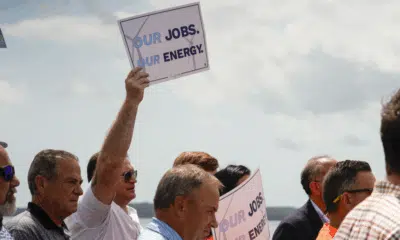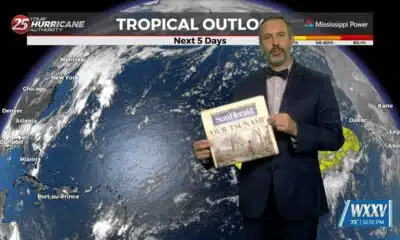News from the South - West Virginia News Feed
Trump’s school choice push adds to momentum in statehouses
by Robbie Sequeira, West Virginia Watch
March 25, 2025
More than a dozen states in the past two years have launched or expanded programs that allow families to use taxpayer dollars to send their students to private schools. Now, President Donald Trump and Republicans in Congress want to supercharge those efforts.
Trump in January issued an executive order directing several federal agencies to allow states, tribes and military families to tap into federal money for so-called school choice opportunities. Those can come in the form of education savings accounts, voucher programs, tax credits or scholarships. Trump’s order also aims to expand access to public charter schools, which are free from some of the rules that apply to traditional public schools.
Meanwhile in Congress, 24 Republican senators have signed on to legislation that would provide $10 billion in annual tax credits to individuals and corporations who make charitable contributions to organizations that provide private-school scholarships. A Nebraska Republican introduced a companion measure in the House.
Already this year, Idaho, Tennessee and Wyoming have approved school choice programs, and bills are advancing in Kansas, New Hampshire, Ohio, South Carolina and Texas. A bill in Mississippi died before advancing. Most of the measures still in play would open programs to all families regardless of income, though some states would cap the total amount of money available.
Supporters of school choice say it gives parents control of their kids’ education — and an escape hatch if they are dissatisfied with their local public school. Many conservatives, religious institutions and private schools are in favor of school choice, along with some people of color who live in districts with underperforming public schools.
“Every child is different. They learn in different environments. There are just so many factors, that I believe that parents should be the ones that make the decision on where their child is going to do the best and have the most success,” said Indiana Republican state Sen. Linda Rogers. A former educator, Rogers has sponsored a bill in her state that would provide additional money to charter schools, which are considered to be a form of school choice.
Opponents, including teachers unions, public school professionals and many rural lawmakers of both parties, say such measures undermine traditional public schools by shifting money away from them.
“When we start to take from public schools, we’re hurting our kids, our lower-income kids. They will not prosper from this legislation,” Tennessee Democratic state Rep. Ronnie Glynn said during the floor debate on a far-reaching voucher bill in his state.
Joshua Cowen, a professor of education policy at Michigan State University, said vouchers are a budget-buster for states.
“Vouchers don’t shift costs — they add costs,” Cowen said in a phone interview. “Most voucher recipients were already in private schools, meaning states are paying for education they previously didn’t have to fund.”
The switch to remote learning during the COVID-19 pandemic, which gave parents a front-row seat to watch what their children were — or were not — learning in their classes, contributed to the recent school choice momentum. So did parent frustration over prolonged public school closures.
I believe that parents should be the ones that make the decision on where their child is going to do the best and have the most success.
– Indiana Republican state Sen. Linda Rogers
“Parents got a good look into sort of what was happening in schools,” said Bella DiMarco, a senior K-12 education policy analyst at FutureEd, an independent think tank at Georgetown University. “There was a lot of talk during the pandemic around school choice … of what public schools aren’t doing for their kids.”
The first modern school voucher program, created in Milwaukee in 1990, was a bipartisan effort to help lower-income families afford private schools. In recent years, more states have moved from school choice programs focused on certain groups, such as low-income students or students with disabilities, to universal programs open to students of all backgrounds.
“Historically, the programs were always sort of targeted to students in need,” DiMarco said. “But in the last couple of years, the new push has been for these universal programs.”
Currently, more than 30 states and Washington, D.C., have at least one school choice program. More than a dozen states now offer universal or near-universal access, allowing K–12 students to participate in school choice regardless of income.
EdChoice, a nonprofit that advocates for school choice, estimates that 1.2 million students are attending private schools this school year with the help of public tax credits, scholarships or vouchers.
Different strategies
States that enacted school choice programs this year have pursued different strategies.
The program Idaho enacted last month, for example, will provide an annual tax credit of $5,000 per child ($7,500 for students with disabilities) to help cover private education expenses.
Most voucher recipients were already in private schools, meaning states are paying for education they previously didn’t have to fund.
– Joshua Cowen, a professor of education policy at Michigan State University
Tennessee’s new program will provide 20,000 scholarships of roughly $7,000 each. During its first year, half of the Tennessee scholarships will be reserved for households earning less than $173,000 for a family of four, but that restriction will be removed in subsequent years.
About 65% of the Tennessee vouchers are expected to be awarded to students who already attend private schools, according to a legislative analysis.
Critics say the cost of the program will grow quickly, creating a hole in the state’s budget. Tennessee Republican Gov. Bill Lee, who pushed hard for the proposal, suggested that Trump’s executive order might provide additional resources. Lee told reporters he hasn’t yet analyzed the order, “but I think there’s opportunity there.”
“The president wants to support states like ours who are advocating for school choice,” Lee said in a news conference after lawmakers approved the measure. Lee was at the White House on Thursday when Trump signed an order calling for the U.S. Department of Education to be dismantled.
Texas lawmakers also are actively debating a voucher program, a longtime priority for Republican Gov. Greg Abbott, who worked to defeat resistant rural Republicans in last year’s state legislative elections and who also attended the White House event. The Senate passed a bill that would provide $10,000 per student ($11,500 for students with disabilities) annually through education savings accounts. A similar House proposal is under review.
Kansas is considering a universal refundable tax credit — $8,000 per child for accredited private school tuition and $4,000 for non-accredited private schools. The program starts with a $125 million cap, increasing annually if participation hits certain thresholds.
Ballot box defeats
School choice opponents question the wisdom of sending taxpayer dollars to schools that may lack certified teachers, follow nonstandardized curricula or discriminate in admissions. Many private schools have testing standards, maintain religious requirements or exclude LGBTQ+ students or those with certain disabilities, for example.
In some Republican-led states that have expanded school choice, Democrats have filed bills to increase oversight and place restrictions on these programs. A bill in Tennessee would require background checks for teachers at private schools that receive voucher money. And an Iowa bill would require that property tax statements include information on how much money education savings accounts subtracted from local public schools.
As voucher programs have grown, they have attracted greater scrutiny.
ProPublica, an investigative journalism outlet, last year found that Arizona’s universal voucher program has mostly benefited wealthier families. Some Arizona parents have tried to use voucher money to pay for dune buggies and expensive Lego sets, according to press reports.
Critics also note that despite recent legislative successes, school ballot initiatives fared poorly at the ballot box last fall.
Voters in Colorado rejected a measure that sought to enshrine school choice rights in the state constitution.
In Nebraska, voters partially repealed a state-funded private school scholarship program.
And in Kentucky, voters overwhelmingly rejected a constitutional amendment that would have allowed the use of public money to support private schools, with 65% of voters — and a majority in every county — opposed.
“There’s a handful of these billionaires that have been pushing vouchers for 30 years,” said Cowen, the Michigan State University professor. “The school choice movement is not necessarily driven by public demand, but rather by wealthy donors and political maneuvering.”
Stateline reporter Robbie Sequeira can be reached at rsequeira@stateline.org.
GET THE MORNING HEADLINES.
West Virginia Watch is part of States Newsroom, a nonprofit news network supported by grants and a coalition of donors as a 501c(3) public charity. West Virginia Watch maintains editorial independence. Contact Editor Leann Ray for questions: info@westvirginiawatch.com.
The post Trump’s school choice push adds to momentum in statehouses appeared first on westvirginiawatch.com
News from the South - West Virginia News Feed
WV Supreme Court will hear BOE’s appeal in vaccine lawsuit — but not right away
by Lori Kersey, West Virginia Watch
September 5, 2025
West Virginia’s highest court will take on a legal battle over the state’s school vaccination requirements, but it denied a request by state school officials that it do so quickly.
The state Supreme Court on Thursday set a deadline of Dec. 12 for the West Virginia Board of Education to prepare its appeal of a Raleigh County judge’s July ruling against it. That ruling was in regards to a lawsuit brought by three Raleigh County families over the board’s refusal to accept religious exemptions to the state’s mandatory school vaccine requirements.
Raleigh County Circuit Judge Michael Froble in July granted a preliminary injunction in the case that allows students in the case to attend class with a religious exemption to the vaccination requirements.
The school board had filed notice of appeal and asked the high court to both expedite a review of the appeal and temporarily halt the proceedings in the lower court.
In the scheduling order Thursday, the court denied both motions. Justices also set a deadline of Jan. 26 for the plaintiffs in the case to respond to the board’s appeal. The board will then have until Feb. 16, 2026 to write a reply, if necessary.
After the Feb. 16 reply brief deadline, the court writes, the appeal will be ready for review.
The Raleigh lawsuit is one case in a legal battle over religious freedom and the state’s strict school vaccination requirements. Every state requires school students to be vaccinated against a number of infectious diseases including polio, chicken pox and measles. Florida officials announced this week plans to eliminate its vaccine mandates.
West Virginia has been one of only five states that have not allowed students to opt out of the shots because of their religious or philosophical objections to them.
West Virginia Gov. Patrick Morrisey issued an executive order on his second day in office requiring the state to allow religious exemptions. His order is based on the 2023 Equal Protection for Religion Act. He argues that the religious freedom law, when read alongside the vaccination law, calls for the religious exemptions.
Morrisey has not rescinded that executive order, even though the state Legislature earlier this year rejected a bill that would have established those religious exemptions in state code.
Raleigh County Circuit Judge Michael Froble has scheduled a two-day hearing next week on a permanent injunction in the lawsuit, which he recently consolidated with a lawsuit brought against the state health department by two parents of immunocompromised students over its issuance of religious exemptions. Plaintiffs in that case are represented by the ACLU of West Virginia and Mountain State Justice.
The hearing is set for Sept. 10 and 11 at the Raleigh County Judicial Center. During that hearing, the judge has said he wants to consider issues that include whether the state’s vaccination law is constitutional without religious exemptions and the authority of Morrisey’s executive order.
YOU MAKE OUR WORK POSSIBLE.
West Virginia Watch is part of States Newsroom, a nonprofit news network supported by grants and a coalition of donors as a 501c(3) public charity. West Virginia Watch maintains editorial independence. Contact Editor Leann Ray for questions: info@westvirginiawatch.com.
The post WV Supreme Court will hear BOE’s appeal in vaccine lawsuit — but not right away appeared first on westvirginiawatch.com
Note: The following A.I. based commentary is not part of the original article, reproduced above, but is offered in the hopes that it will promote greater media literacy and critical thinking, by making any potential bias more visible to the reader –Staff Editor.
Political Bias Rating: Centrist
The content presents a factual and balanced overview of the legal dispute surrounding vaccine exemptions in West Virginia without evident partisan language or framing. It reports on actions taken by government officials, court decisions, and ongoing lawsuits from multiple perspectives, including those of the state board, families, and advocacy groups. The neutral tone and focus on legal developments suggest a centrist approach, aiming to inform rather than persuade toward a particular political viewpoint.
News from the South - West Virginia News Feed
Christian’s Morning Forecast: Strong to Severe Storms Incoming
SUMMARY: Storm Watch meteorologist Christian Boler reports strong to severe storms approaching West Virginia, especially McDow, Tazewell, and Wyoming counties during the morning commute. Temperatures will remain in the upper 60s to low 70s with southwest winds around 5-10 mph. A marginal severe weather threat exists across the region, mainly involving winds and flooding, but no tornadoes or hail expected. Rainfall of a quarter to half an inch is likely over 48 hours with isolated downpours. Storms will arrive in two waves before clearing Friday. Another front may bring showers Saturday, but high pressure will clear skies for the weekend and beyond.
FOLLOW US ON FACEBOOK AND TWITTER:
https://facebook.com/WOAYNewsWatch
https://twitter.com/WOAYNewsWatch
News from the South - West Virginia News Feed
More states guarantee students the right to school-day religious instruction off campus
by Robbie Sequeira, West Virginia Watch
September 4, 2025
In the past month or so, federal courts have dealt a string of blows to conservatives’ push for the biblical Ten Commandments to be posted in public schools.
Yet as states lose over required religious displays, many are working on another route to faith-based education by allowing kids to attend off-campus religious instruction. This year, Iowa, Montana, Ohio and Texas passed laws guaranteeing parents the right to have their children excused during the school day for free, off-campus religious instruction, often called “released time.”
Those four states are the latest of at least 12 that require school districts to offer released time religious schooling upon parental request, including: Florida, Hawaii, Kentucky, New York, North Dakota, Pennsylvania, Vermont and Wisconsin.
The released time approach may be more likely to pass constitutional muster than other government-imposed religious efforts, experts say, by shifting influence off school grounds and under the direction of faith-based groups rather than public school teachers, and by making it free to students.
A 1952 U.S. Supreme Court decision in Zorach v. Clauson allows for released time religious instruction as long as it’s off school property, privately funded and parent permitted.
“Not every family has access to private or parochial school, but for many generations families have been able to take their students out of school for a portion of the day for religious education if they choose,” said Jennifer Jury, a program advocate for LifeWise Academy, an Ohio-based Christian nonprofit founded in 2018.
The organization has been active in expanding its reach and lobbying lawmakers for stronger legislative support. This school year, LifeWise expects to serve nearly 100,000 public school students across 1,100 schools in 34 states, Jury said.
The off-campus gatherings work the same way in most states: With parents’ approval, public school students sign out of school during a lunch, recess or study hall block. Students will either walk or ride one of the distinctive red LifeWise buses to a local church or a program-leased community building in town.
And depending on state limitations for the religious instruction, for either a half or full hour, kids will learn about the Bible. When the allotted time is up, students go back to their public school to finish the day.
In some states, students can earn academic credit for the off-campus instruction, which has been more controversial.
In Montana, for example, legislation that would have required school districts to develop policies for academic credit was amended to “authorize” a district to allow credit, after pushback from the state’s school boards and school administrators associations.
“School districts should have the autonomy to determine which external coursework aligns with the academic frameworks and whether such courses should be eligible for credit,” Rob Watson, who represented the two groups at the legislature, said in his comments to a House committee in February. He noted the groups did not oppose the released time policy itself.
Despite the changes, only one Democrat in the legislature voted “yes.” Montana GOP Gov. Greg Gianforte signed the bill into law in May.
Supporters had touted the academic credit option as a way to entice homeschooling families to consider public schools. In her interview with Stateline, Jury noted similar programs that accommodate Jewish, Muslim and Mormon faith-based teaching for public school students.
“Whether a person is religious or not, the Bible is widely recognized as one of the most influential books in history,” Jury said. “A lot of our Western culture was born out of ideas that come from the Bible, like the fact that every person is created equal, that we are to love our neighbor.”
Identical bill language
The conservative American Legislative Exchange Council, known as ALEC, in August adopted model legislation about released time policies that state lawmakers can propose.
Public schools would be required to allow dismissal for religious instruction under new bill
ALEC’s proposal would allow from one to five hours per week of off-campus religious instruction and would require school districts to award academic credit if the course meets certain criteria. Districts would have to assess instruction based on secular standards and would not be allowed to test for particular religious content, according to the model legislation.
Nearly identical language had already appeared in several state bills, including in North Carolina and West Virginia this year and in Mississippi in 2023. In North Carolina, LifeWise Academy registered with the secretary of state’s office in 2024, as reported by NC Newsline, and a released time bill was introduced in February. It was sent to committee but never moved ahead.
The bills in Mississippi and West Virginia also stalled.
Legislation that does become law earns praise from groups such as Alliance Defending Freedom, one of the nation’s most active legal organizations opposing abortion rights and same-sex marriage.
Statements from Greg Chafuen, senior counsel for the nonprofit’s Center for Public Policy, say the new released time laws respect “parents’ educational decisions” and ensure “parents are in the driver’s seat when it comes to their kids’ education.”
An Indiana law lets high school students leave school for religious instruction each week for an amount of time equal to one elective course. Ohio, Oklahoma, South Carolina and Tennessee laws allow students to earn elective credit for released time religious instruction, though it cannot replace a “core curriculum” class. School boards can set standards for when such programs qualify for credit.
LifeWise operates in each of those states.
Ten Commandment displays
Jury, of LifeWise Academy, said her organization wants off-campus religious options for public school students to be available in all 50 states.
“It’s important to note this is an option, and parents are the ultimate decision-makers in enrollment,” she said.
“We would love to see every student in the United States have the option to attend a program like LifeWise if they want to and if their parents want them to.”
A lack of parental choice might be what trips up state efforts to post the Ten Commandments in classrooms.
This is an option, and parents are the ultimate decision-makers in enrollment.
– Jennifer Jury, a program advocate for LifeWise Academy
After Louisiana last year became the first state in recent decades to require that the Ten Commandments, a central tenet of the Judeo-Christian tradition, be displayed in school classrooms, bills followed in at least 15 other states. Two states — Arkansas and Texas — enacted laws.
But for now, courts have blocked the mandates in all three states. In Texas, U.S. District Judge Fred Biery warned the displays “are likely to pressure [children] into religious observance” and undermine parents’ rights.
In Arkansas, U.S. District Judge Timothy Brooks called the state’s requirement to post a specific version of the Ten Commandments “plainly unconstitutional.”
The law “is not neutral with respect to religion,” he wrote. “By design, and on its face, the statute mandates the display of expressly religious scripture in every public-school classroom and library.”
He also noted that the law “requires that a specific version of that scripture be used, one that the uncontroverted evidence in this case shows is associated with Protestantism and is exclusionary of other faiths.”
Stateline reporter Robbie Sequeira can be reached at rsequeira@stateline.org.
This story was originally produced by Stateline, which is part of States Newsroom, a nonprofit news network which includes West Virginia Watch, and is supported by grants and a coalition of donors as a 501c(3) public charity.
West Virginia Watch is part of States Newsroom, a nonprofit news network supported by grants and a coalition of donors as a 501c(3) public charity. West Virginia Watch maintains editorial independence. Contact Editor Leann Ray for questions: info@westvirginiawatch.com.
The post More states guarantee students the right to school-day religious instruction off campus appeared first on westvirginiawatch.com
Note: The following A.I. based commentary is not part of the original article, reproduced above, but is offered in the hopes that it will promote greater media literacy and critical thinking, by making any potential bias more visible to the reader –Staff Editor.
Political Bias Rating: Center-Right
This content presents the growing trend of religious education programs in public school contexts with a generally favorable tone, highlighting legislative successes primarily in conservative-led states. The coverage includes references to conservative organizations such as ALEC and Alliance Defending Freedom, and discusses efforts to expand religious instruction in a way that aligns with conservative values emphasizing parental choice and the role of faith in education. However, it also acknowledges the legal challenges and concerns over constitutional boundaries, providing a balanced view that avoids outright advocacy or criticism. The framing and topics suggest a center-right perspective that supports religious accommodations within public education while respecting legal constraints.
-
Mississippi Today5 days ago
DEI, campus culture wars spark early battle between likely GOP rivals for governor in Mississippi
-
Local News Video7 days ago
08/29 Ryan's “Wet End to the Week” Friday Forecast
-
News from the South - Louisiana News Feed4 days ago
‘They broke us down’: New Orleans teachers, fired after Katrina, reflect on lives upended
-
News from the South - South Carolina News Feed7 days ago
Trump revokes Secret Service protection for former Vice President Harris after Biden had extended it
-
News from the South - Missouri News Feed4 days ago
Missouri joins dozens of states in eliminating ‘luxury’ tax on diapers, period products
-
News from the South - Alabama News Feed7 days ago
Appeals court backs Venezuelan migrants’ effort to keep protected status
-
News from the South - Alabama News Feed5 days ago
Alabama state grocery tax to fall 1% on Monday
-
Our Mississippi Home7 days ago
‘Still Unwritten’: Natasha Bedingfield Brings her Chart-topping, TikTok-ing Hits to The Hump for Bulldog Bash














































